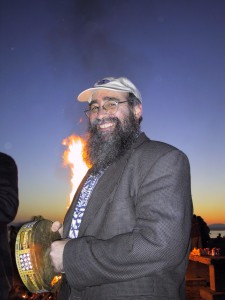
Professor Marty Jaffee, known for his deep insights and great jokes. Photo credit: Andrew Krasnow
On the occasion of his retirement from UW, we reflect on Professor Jaffee’s scholarly contributions and wish him the best of luck in the future.
This fall, the Stroum Jewish Studies Program says goodbye to one of its most eminent colleagues. Professor Martin S. Jaffee, known to all as Marty, is retiring after decades of service as a scholar, teacher, and leader on campus. A professor of Comparative Religion and Jewish Studies at UW since 1987, Jaffee has taught generations of students the courses that are pillars of the program: the history of Judaism, Jewish cultural history, Rabbinic literature and thought, modern Jewish thought, Jewish mysticism, and more. He is the decorated author of several notable books, articles, and critical studies of rabbinic texts which have contributed immeasurably to our understanding of early Judaism and oral culture.
Hillel Kieval was director of Jewish Studies at UW and hired Professor Jaffee in the late 1980s. Now the Goldstein Professor of Jewish History and Thought at Washington University in St. Louis, Kieval speaks unequivocally about Professor Jaffee’s significance for UW specifically and for the field of Jewish Studies more broadly: “Marty made an immediate impact on both the teaching and the research profiles of the Program, grounding his corner of this interdisciplinary field in a sophisticated religious studies methodology. He challenged students to view religious texts as a particular kind of imaginative engagement with the world—sacred mappings of human experience that emerged from concrete institutional settings and followed formal, hermeneutical procedures. To our colleagues in the Jackson School, Marty offered a model of humanistic interrogation that could be piercing and ironic, but which invariably enriched the intellectual life of the faculty. And his scholarly contributions to the field of rabbinic literature have been enormous: Marty’s Torah in the Mouth: Writing and Oral Tradition in Palestinian Judaism (2001) constituted the first, systematic application of insights drawn from studies of orality and oral performance to the world of rabbinic writing, and it has been the springboard for numerous subsequent studies by other, mainly younger scholars.”
One of those younger scholars, Elizabeth Alexander, knows exactly what Professor Kieval is talking about. An Associate Professor of Religious Studies at the University of Virginia, she describes feeling an immediate kinship with Marty Jaffee’s work during graduate school. Professor Alexander relates, “I first encountered Marty’s work when I was a graduate student. I read whatever of his I could get my hands on. . . . I remember thinking to myself that this scholar was asking all the questions that I had, but that the difference between him and me was that he had the expertise to be able to answer them. The idea that he was ‘asking my questions’ is more significant than it might sound at first. The knowledge that academics construct and the rubrics they develop for interpreting data are a function of the questions that they ask. In the field of rabbinics, most scholars simply weren’t asking the questions that I found most compelling. What I found in Marty’s work was a trailblazer for the kind of work I wanted to do.”
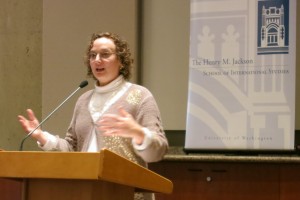
Elizabeth Alexander describes Marty Jaffee’s influential work.
Professor Alexander was the featured speaker at the farewell celebration for Professor Jaffee on October 11th on the UW campus. In this way, she represented the scores of students and colleagues who have been profoundly influenced by his ground-breaking research. She explains, “One theme in Marty’s work is discipleship: the sage acts as living exemplar of Torah for the students. . . . It is an honor for me to speak his ‘Torah’ and to have internalized it so that I can pass it on to my students in his name.”
Current colleagues in the Stroum Jewish Studies Program agree that Professor Jaffee has made a huge difference both on and off campus. Joel S. Migdal, Robert F. Philip Professor of International Studies and former chair of the Stroum Jewish Studies Program (2001-2002), served on the Jackson School faculty with Jaffee and expresses deep respect for his colleague’s abilities: “Marty brought an uncommon combination of skills to his research. He was unparalleled in his ability to delve deeply into the Talmudic and related texts. But he also brought a sociologist’s eye to those texts, reconstructing the social order that the rabbis created.”
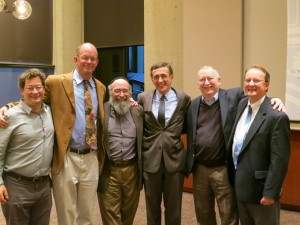
Colleagues toasting Marty Jaffee at the October 11th tribute. L-R: Noam Pianko, Jim Wellman, Marty Jaffee, Resat Kasaba, Mike Williams, and Bob Stacey.
Paul Burstein, Professor of Sociology and former Chair of the Stroum Jewish Studies Program (2003-2008), emphasizes Jaffee’s dual roles: “As a teacher, he was enthusiastic, dedicated, and effective, playing a critical role in the Program and also serving as a voice for the Program in the community.” Indeed, Professor Jaffee was not one to hide in the ivory tower, instead embracing the role of public intellectual. Beginning in 2004, he wrote a monthly op/ed column, “A View from the U,” for JTNews: The Voice of Jewish Washington. He also guested on radio shows for KUOW (National Public Radio) and KOL-am 1300.
Professor Noam Pianko, current chair of the Stroum Jewish Studies Program, recognizes that the UW has benefited enormously from the presence of such a versatile faculty member over the past three and a half decades. “Marty anchored our curriculum with a broad range of text classes, from rabbinics to Jewish mysticism. It will be incredibly difficult to fill his shoes.” Perhaps Professor Kieval best summarizes why Professor Jaffee is so beloved by the UW community: “For me, Marty has been an irreplaceable teacher and friend—study partner, critic, and intellectual stimulant, who also knows how to tell and receive a good joke.”
Editor’s note: This article by Hannah Pressman appeared as part of the Stroum Jewish Studies Program’s Fall 2012 Annual Report. Click here to access the full PDF of the newsletter, which includes feature articles, a Sephardic Treasures photo spread, Save-the-Dates, and more.

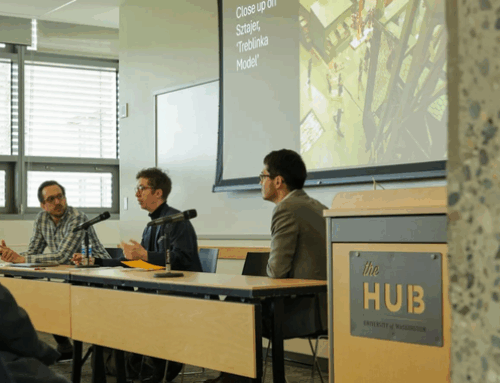
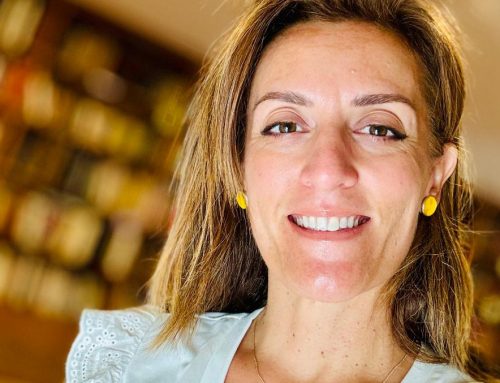

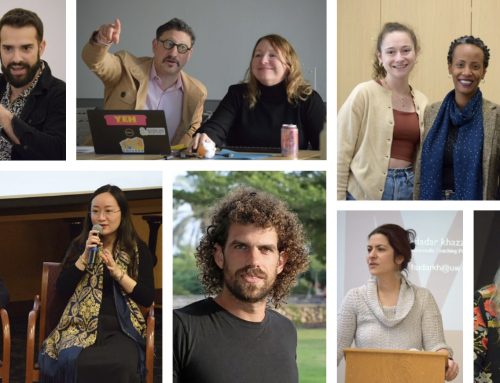
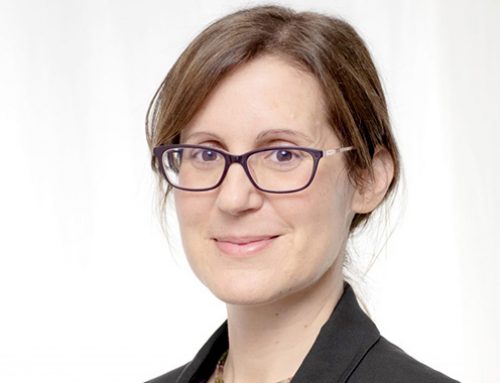

I had occasion to interview Professor Jaffee a few years back for a study series Imwas teaching on first-century Judea. He was brilliant, scholarly, professional and friendly. We spent over an hour on the phone and he was instrumental in brushing the dust of of some misconceptions spreading through synagogues and churches worldwide. Best wishes to the professor as he enjoys his retirement.